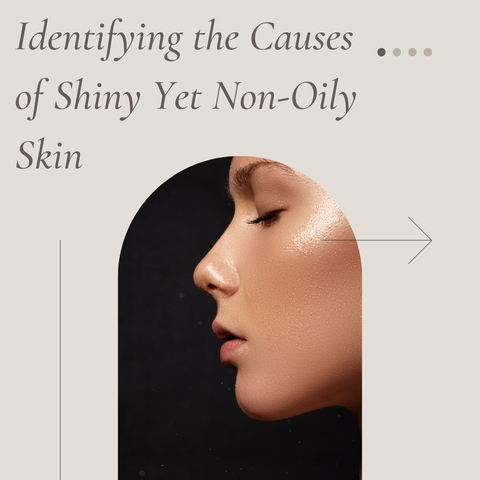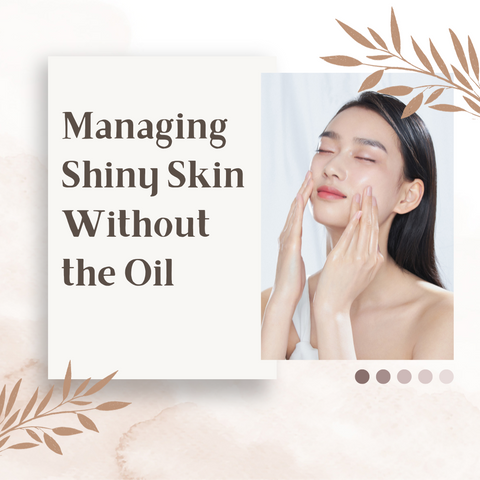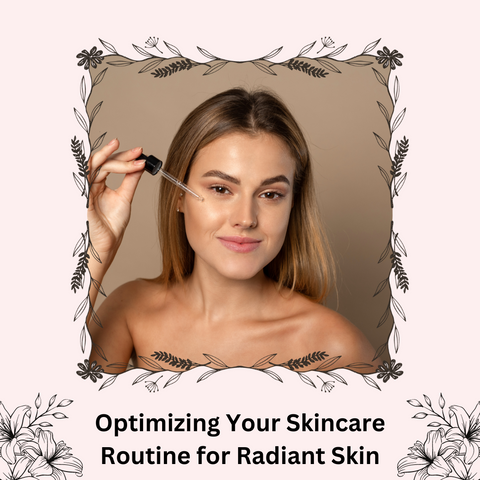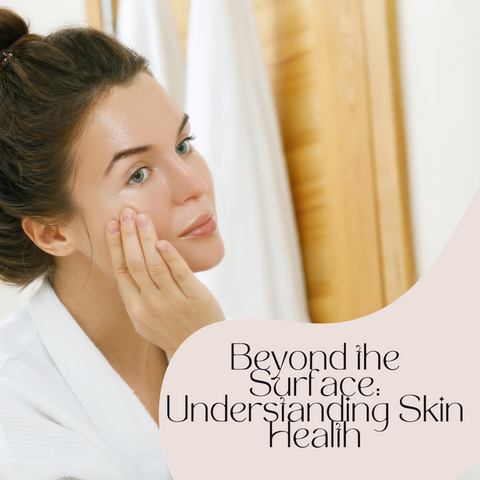To achieve a non-oily shining complexion, control oil production while encouraging healthy skin radiance. In this blog, we will look at some techniques for achieving this balance.
Identifying the Causes of Shiny Yet Non-Oily Skin

A range of variables that encourage natural skin radiance without creating excessive oil production might result in shiny, non-oily skin. Genetics, hydration, healthy sebum production, skincare products, exfoliation, healthy food and lifestyle, climate and environment, makeup or highlighting products, medications, and health concerns are all possible causes. It is important to distinguish between a natural, healthy shine and excessive oiliness. While a shiny complexion is natural and healthy, excessive oil production (seborrhea) can cause an overly shiny, greasy appearance and is related to skin problems such as acne.
Differentiating Between Hydration Glow and Oiliness
Understanding the visual cues and characteristics associated with each condition is necessary for distinguishing between hydration, glow, and oiliness:
-
Hydration Glow: Hydration glow skin appears dewy, luminous, and plump. It has a healthy, natural radiance and evenly reflects light. The skin feels soft, supple, and moisturised without being greasy or slick. A hydration glow is caused by well-hydrated skin with adequate water content. It is possible to achieve this through proper skincare routines, internal hydration, and the use of hydrating products.
-
Oiliness: Oily skin appears shiny, often excessively so, with an uneven shine across the face, particularly in the T-zone (forehead, nose, and chin). The gleam may appear greasy or slick. Oily skin can feel slick, sticky, or greasy to the touch. Due to excessive oil production, pores may appear enlarged, and makeup may not stay in place. Excessive oiliness is caused by the skin producing too much sebum. Genetics, hormonal changes, poor skincare, and environmental conditions can all play a role.
It's vital to note that a moisturised shine is desired for healthy-looking skin, yet controlling excess oiliness is critical for avoiding skin problems like acne. It is critical to tailor your skincare routine to retain enough moisture without worsening oiliness. If you're confused about your skin type or have concerns, consulting a dermatologist or skincare professional can provide personalised advice tailored to your skin's individual needs.
Role of Sebaceous Glands in Skin Shine
Sebaceous glands play an important part in skin shine by creating sebum, an oily material that contributes to skin hydration, protection, and, occasionally, a shiny appearance. Understanding their function is essential to understanding the mechanism underlying skin shine.
-
Sebum Production: Sebaceous glands are found all over the skin, but especially on the face and scalp. These glands secrete sebum, an oily substance made up of lipids, wax esters, triglycerides, and cholesterol. Sebum production is a natural process that differs from person to person and is influenced by genetics, hormones, and environmental factors.
-
Skin Hydration: Sebum acts as a natural moisturiser, forming a protective barrier on the skin's surface. It aids in moisture retention, preventing excessive water loss and keeping skin hydrated. Skin that is properly hydrated appears plump, supple, and healthy.
-
Skin Barrier Function: Sebum helps to maintain the skin's barrier function, which protects it from external irritants, pollutants, and pathogens. It functions as a natural defence mechanism, improving skin health and resilience.
-
Skin Shine: While sebum is necessary for skin health, excessive sebum production can cause skin to appear shiny or oily. The presence of excess sebum on the skin's surface reflects light, creating a shiny or greasy appearance, especially in areas like the forehead, nose (T-zone), and chin.
-
Factors Affecting Sebum Production: Stress, diet, skincare products, genetics, hormonal fluctuations, and environmental factors can all have an impact on sebum production. Hormones such as androgens stimulate the sebaceous glands, potentially increasing sebum production, especially during puberty, menstruation, or times of stress.
Managing Sebum Production:
-
Proper skincare routines that include gentle cleansing can help remove excess sebum without stripping the skin of its natural oils.
-
Using non-comedogenic and oil-free skincare products can help to control shine without clogging pores.
-
Certain ingredients, such as salicylic acid or niacinamide, may aid in the regulation of sebum production and the control of shine.
Balancing sebum production is critical for maintaining healthy skin. While sebum helps to hydrate and protect the skin, too much sebum can cause a shiny or oily appearance. Understanding and controlling sebum production through proper skincare practises is essential for maintaining a balanced and healthy complexion.
Environmental Factors Affecting Skin Sheen
Several environmental factors can have an impact on skin sheen, which affects how radiant or shiny your skin appears. These variables can have an effect on sebum production, hydration levels, and overall skin health, resulting in variations in skin sheen. Some environmental factors are as follows:
-
Humidity Levels: High humidity levels can increase skin moisture content, contributing to a dewy or hydrated appearance. Low humidity, on the other hand, can cause dry skin that appears dull or lacklustre.
-
Temperature: Extreme temperatures, whether hot or cold, can have an impact on the skin's oil production and hydration. Excessive heat can stimulate sebaceous glands, resulting in increased sebum production and a shiny complexion. Dryness and a lack of sheen can occur as a result of cold weather.
-
UV Exposure: Prolonged exposure to ultraviolet (UV) radiation from the sun can dehydrate the skin and cause it to appear dry or dull. Short-term exposure, on the other hand, may cause a temporary increase in skin sheen due to mild skin irritation or inflammation.
-
Pollution: Pollutants from the environment, such as particulate matter, ozone, and chemicals, can accumulate on the skin, compromising its natural protective barrier. This can disrupt sebum production, leading to either excess shine due to increased oiliness or a lack of radiance due to compromised skin health.
-
Indoor Heating and Air Conditioning: Creating artificial indoor environments with heating or air conditioning systems can contribute to lower humidity levels, resulting in dry skin and a loss of skin sheen.
-
Seasonal Changes: Seasonal changes can have an impact on skin condition. For example, during the colder months, skin may appear dull due to dryness, whereas increased humidity may contribute to a more glowing complexion during the warmer months.
-
Stress and Lifestyle Factors: Psychological stress, lack of sleep, poor diet, and lifestyle choices can all have an impact on skin health and sebum production, potentially leading to changes in skin sheen.
Understanding how environmental elements affect your skin can assist you in adapting your skincare routine to maintain a healthy, beautiful complexion in the face of shifting external influences. Skin shine and overall skin health can be managed by adjusting skincare practises in response to environmental changes.
Managing Shiny Skin Without the Oil

Maintaining a balanced skincare routine that minimises shine while retaining the skin's natural moisture is essential for managing glossy skin without excessive oiliness. Gentle cleansing, oil-free and mattifying products, salicylic acid or niacinamide, use of clay masks, hydration with light moisturisers, blotting papers or powder, avoiding over-cleansing, sun protection, diet and hydration, and a consistent skincare routine are some ways to manage shine without adding more oil. It's vital to realise that some natural skin radiance is healthy, but controlling excessive shine without adding more oil is all about striking the appropriate balance. Consider consulting a dermatologist or skincare specialist for personalised advice if you need clarification on the ideal products or practises for your skin type.
Effective Skincare Products for Balanced Shine
Choosing the proper skincare products developed to regulate excess oil without losing moisture is vital for a balanced shine and healthy-looking skin. Here are some excellent skincare products for controlling shine while preserving skin balance:
-
Gentle Cleanser: Choose an oil-free cleanser that is gentle enough to remove excess oil and impurities without removing the skin's natural moisture barrier. If you want to reduce shine, look for substances like glycolic or salicylic acid.
-
Oil-Free Moisturiser: Select a moisturiser that is lightweight, oil-free, or gel-based and hydrates the skin without adding shine. Look for products containing hyaluronic acid, which provides hydration without clogging pores or leaving you feeling greasy.
-
Mattifying Primer: Before applying makeup, use a mattifying primer to control shine throughout the day. Mattifying primers reduce shine and provide a smooth canvas for makeup application.
-
Oil-Control Serum or Treatment: Consider utilising serums or treatments designed to minimise shine and manage oil production. Niacinamide, salicylic acid, and witch hazel-containing products can help regulate sebum and maintain a balanced complexion.
-
Clay Masks: Use clay masks containing ingredients such as kaolin or bentonite on a weekly or biweekly basis. These masks absorb excess oil, refine pores, and reduce shine without drying out the skin.
-
Oil-Absorbing Sheets: Keep oil-absorbing sheets or blotting papers on hand to quickly absorb excess oil without disturbing makeup throughout the day. Blotting papers are useful for controlling shine without applying additional product to the skin.
-
Non-Comedogenic Sunscreen: To protect your skin from UV damage without contributing to shine, use a non-comedogenic sunscreen with a matte or oil-free formulation. Look for SPF products that are appropriate for oily or combination skin.
-
Hydrating Mist: To refresh and hydrate your skin while balancing shine, use a hydrating facial mist containing ingredients like rose water or glycerin.
-
Exfoliating Treatment: Use a gentle exfoliating treatment with alpha or beta hydroxy acids to unclog pores and remove dead skin cells, reducing the likelihood of shine.
-
Balancing Toner: Use a gentle, alcohol-free toner designed to regulate pH levels and eliminate pollutants without drying out the skin. Look for toners that contain relaxing components such as witch hazel or green tea.
When choosing these products, keep in mind your skin type, whether oily, combination, or sensitive, and choose formulations that are adapted to your unique needs. Regular use of these products, in conjunction with a consistent skincare routine, can aid in the management of shine and the promotion of a balanced, healthy complexion.
Diet and Lifestyle Tips for Healthy Skin Glow
Maintaining a balanced diet and lifestyle can help you achieve a vibrant and beautiful complexion. Stay hydrated, eat a balanced diet, include antioxidant-rich foods, and omega-3 fatty acids, limit sugars and processed foods, and healthy fats, manage stress, adequate sleep, engage in regular exercise, get sun protection, and avoid smoking and excessive alcohol consumption. Maintaining a healthy lifestyle, together with a portion of nutritious and hydrating food, is critical to achieving and maintaining a healthy and bright complexion. Including these practises in your everyday routine can help you achieve glowing skin from the inside out.
Seasonal Adjustments in Skincare for Shine Control
Seasonal changes can impact skin health and oil production, requiring adjustments in skincare routines to manage shine effectively. Here are seasonal skincare tips for shine control throughout the year:
-
Spring: Make the switch to lightweight skincare products. To adapt rising temperatures, use oil-free or gel-based moisturisers. Begin moderate exfoliation to exfoliate dead skin cells that have accumulated during the winter. For a glowing complexion, consider utilising chemical exfoliants such as AHAs or BHAs. As the sun gets stronger, make sure to use a lightweight, non-greasy sunscreen on a regular basis to protect against UV rays and avoid sun-induced shine.
-
Summer: Choose oil-free formulations for sunscreen, moisturisers, and cosmetics. To control shine and set makeup, use mattifying primers. Increase the frequency with which you cleanse, especially after sweating. To eliminate perspiration, oil, and sunscreen residue, use a gentle foamy cleanser. Maintain moisture despite the heat by using lightweight, oil-free serums or hydrating mists to keep the skin balanced without feeling greasy.
-
Fall: To combat cooler, drier air, move to slightly richer, but non-comedogenic, moisturisers when the temperature drops. Use moisturising masks or nighttime treatments to replace moisture and avoid dryness, which can lead to excessive oil production. Even in milder conditions, maintain constant sun protection. To protect your skin from UV rays, apply a broad-spectrum sunscreen.
-
Winter: To fight dry indoor heating, use thicker moisturisers or face oils, but make sure they are non-comedogenic to avoid blocking pores. Reduce the frequency of exfoliation to avoid over-drying the skin. To keep your skin clear, use a gentle exfoliation once a week. Indoor humidifiers can help battle dry air and prevent severe dehydration, which can lead to rebound oiliness.
Maintaining a consistent routine that includes adequate cleansing, hydration, sun protection, and modifying product textures will help manage shine efficiently without compromising skin health, regardless of the season. As the seasons change, adjust your skincare routine to meet your skin's shifting needs. If specific concerns continue, consult a dermatologist or skincare specialist for personalised guidance.
Optimizing Your Skincare Routine for Radiant Skin

Consider combining the following procedures and products into your skincare routine for beautiful skin: washing, exfoliation, toning, serums/treatments, eye cream, moisturiser, sunscreen, masks/treatments, face oils (optional), hydration, and a healthy lifestyle. To avoid unwanted skin sensitivities, always patch-test new products and gradually incorporate them into your regimen. In skincare, consistency is essential; give products time to work and be patient with routine tweaks. If you have specific skin concerns, consulting a dermatologist or skincare professional can provide tailored skincare advice.
Choosing the Right Moisturizers for a Dewy Look
Choosing the appropriate moisturiser is essential to getting a dewy appearance. Look for moisturisers that contain hydrating and skin-loving ingredients to promote a radiant and dewy complexion. Here are some things to think about:
-
Hydrating Ingredients: Look for moisturisers that contain hyaluronic acid, glycerin, or ceramides. These humectants attract moisture to the skin, keeping it hydrated and plump.
-
Lightweight Formulas: Look for non-greasy, lightweight formulas that provide adequate hydration without feeling heavy on the skin. Gel-based or water-based moisturisers are ideal for a dewy appearance, especially if you have oily or combination skin.
-
Light-Reflecting or Illuminating Properties: Look for moisturisers that have light-reflecting or illuminating properties. Mica and pearl powder can add a subtle radiance to the skin, enhancing the dewy effect.
-
Nourishing Oils: Look for moisturisers that contain nourishing oils like jojoba oil, argan oil, or rosehip oil. These oils aid in moisture retention and provide a healthy glow without leaving a greasy residue.
-
Vitamins and antioxidants: Moisturisers infused with vitamins (such as Vitamin E or C) and antioxidants nourish the skin, protect it from environmental stressors, and promote a radiant complexion.
-
Non-Comedogenic: Check that the moisturiser is non-comedogenic, especially if you have oily or acne-prone skin, to avoid clogged pores and breakouts while maintaining a dewy appearance.
-
SPF Inclusion: To protect your skin from harmful UV rays, consider using a moisturiser with SPF. However, for optimal sun protection, especially during prolonged sun exposure, a dedicated sunscreen may be more effective.
-
Patch Testing and Trialling: Always patch-test new products to ensure that there are no adverse reactions. Also, before committing to a full-size moisturiser, try samples or travel-sized versions to ensure it suits your skin type and provides the desired dewy effect.
The Importance of Gentle Cleansing
Gentle cleansing is essential for keeping skin healthy and balanced. It is useful in skincare because it effectively removes impurities, excess oil, pollutants, and makeup residue without interfering with the skin's natural barrier. Here are some of the reasons why gentle cleaning is essential:
-
Skin Barrier Preservation: Harsh cleansers can strip the skin's natural oils, disrupting the skin barrier. Gentle cleansers aid in the retention of the skin's natural moisture, shielding it from environmental stressors and preventing dryness or irritation.
-
Prevents Over-Drying: For those with dry or sensitive skin, aggressive cleansing can cause over-drying. Gentle cleansers help to cleanse the skin without causing it to become overly dry or tight.
-
Reduces Irritation: Harsh ingredients or vigorous cleansing can irritate the skin, causing it to become red, irritated, or sensitive. Gentle cleansers are gentler on the skin and reduce the risk of irritation.
-
Balances Oil Production: Gentle cleansing is essential for oily or acne-prone skin to remove excess oil and impurities without causing an overproduction of sebum. This aids in the maintenance of a more balanced oil level in the skin.
-
Skin is Better Prepared for Skincare Products: Cleaning helps the skin absorb the benefits of later skincare products and makes it possible for them to enter the skin more deeply.
-
Appropriate for All Skin Types: Mild cleansers work well on all skin types, including combination, oily, dry, sensitive, and acne-prone skin.
-
Promotes Skin Health: Gentle cleansing promotes general skin health and a more youthful appearance by preserving the skin's natural pH balance.
When looking for a gentle cleanser, search for labels that say "gentle," "mild," "soap-free," or "pH-balanced." Ingredients such as glycerin, aloe vera, ceramides, and botanical extracts are frequently included in gentle cleansers and can help to maintain skin hydration and health. Developing a gentle washing practise in which you cleanse your face with a light cleanser morning and night is essential for maintaining healthy, bright, and balanced skin. However, keep in mind that everyone's skin is different, so finding the perfect gentle cleanser adapted to your specific skin type and issues is vital for an effective skincare regimen.
Preventing Overhydration and Maintaining Skin Balance
It is important to maintain skin balance in order to avoid overhydration or excessive dryness. To achieve this balance, you must first determine your skin type and then develop a skincare programme that addresses its individual demands. Here are some tips to avoid overhydration and preserve skin balance:
-
Know Your Skin Type: Understanding whether you have oily, dry, combination, or sensitive skin is critical. Make your skincare routine specific to your skin's needs.
-
Use a Gentle Cleanser: Use a mild, gentle cleanser that is appropriate for your skin type to cleanse your face. Avoid using harsh soaps or cleansers that deplete the skin's natural oils.
-
Moisturise Properly: Use a moisturiser that is appropriate for your skin type. If you have oily skin, choose lightweight, oil-free moisturisers. For dry skin, use richer, more hydrating formulas.
-
Do not Overuse Hydrating Products: Use hydrating products like serums or moisturisers with caution. Excessive use, particularly of heavy creams or hydrating serums, can result in dehydration or clogged pores.
-
Balanced Hydration: Find a happy medium between hydration and moisture. The amount of water present is referred to as hydration, whereas moisture is the act of trapping that hydration. This equilibrium can be accomplished by hydrating with humectants such as hyaluronic acid and retaining moisture with occlusive agents such as specific oils or shea butter.
-
Avoid Product Overloading: Limit the number of skincare products you use, particularly those containing active ingredients. Layering too many products might overwhelm the skin and disrupt its balance.
-
Observe Your Skin's Reaction: Pay attention to how your skin reacts to different products and adjust your routine accordingly. Consider changing your skincare routine if your skin feels overly oily or dry.
-
Sun Protection: Apply sunscreen to your skin on a daily basis to protect it from UV damage. Choose non-comedogenic, oil-free sunscreen formulations if you have oily or acne-prone skin.
-
Stay Hydrated: Keep your body hydrated by drinking plenty of water, as proper internal hydration can improve skin health.
-
Consult a Professional: If you are unsure about the best products or routines for your skin, consider seeking personalised advice from a dermatologist or skincare professional.
Beyond the Surface: Understanding Skin Health

Understanding skin health extends beyond outward looks to include recognition of the various functions and structures that contribute to total skin well-being. Skin as an organ, skin layers, skin functions, skin microbiome, skin ailments and disorders, lifestyle and environmental effects, ageing and skin health, holistic approach, individual variances, and professional assistance are the main factors to understanding skin health. Individuals can maintain healthier, more beautiful skin by taking a holistic approach to skin care and caring for it both inwardly and externally.
The Connection Between Stress and Skin Shine
The primary mechanism linking stress and skin shine is the body's reaction to stressors, which can alter hormone levels and thus impact skin oil production.
-
Hormonal Influence: Cortisol, often known as the stress hormone, is produced in response to stress. Elevated cortisol levels can stimulate the sebaceous glands' ability to create sebum, or skin oil. Because of excessive sebum production, the T-zone, which covers the forehead, nose, and chin, is especially prone to a shiny complexion.
-
Stress-Induced Hormonal Changes: Stress has the ability to throw off the hormonal equilibrium, especially with regard to androgen hormones such as testosterone. Androgens have the ability to activate the sebaceous glands, which increases oil production and gives the appearance of shiny skin.
-
Inflammatory Response: Stress can aggravate internal inflammation, which can have an impact on the skin. Stressful times can exacerbate inflammatory skin conditions like acne or rosacea, which can cause increased redness and shininess from increased oil production and inflammation.
-
Skin Barrier Disruption: Extended stress can weaken the skin's protective barrier, leaving it more vulnerable to outside allergens and dehydration. This disruption can lead to dehydration, prompting the skin to produce more oil in an attempt to compensate for the moisture loss.
-
Behavioural Factors: Behaviours that affect the skin can also be influenced by stress. For example, people who are stressed out might skip their skincare regimen, which could result in using harsh products or improper cleansing, which would exacerbate oiliness.
While stress management can help you have healthier skin, dealing with skin problems caused by stress may necessitate professional help from dermatologists or skincare professionals. Incorporating stress-relief techniques into daily life can benefit both mental health and skin health.
Long-term Strategies for Maintaining Non-Oily Radiance
Long-term non-oily radiance requires continuous skincare practises, a healthy lifestyle, and focused solutions specific to your skin type. A balanced skincare routine, regular cleansing, exfoliation, hydration without oiliness, non-comedogenic formulas, mattifying products, sun protection, a healthy diet and hydration, stress management, and consultation with a professional are some long-term strategies to achieve and sustain a radiant complexion without excess oiliness. Reassess your skincare routine on a regular basis and make adjustments as needed depending on seasonal changes, hormonal variations, or changes in skin condition. By implementing these tactics into your long-term skincare regimen, you may create a healthy, vibrant complexion while efficiently regulating oiliness.
Expert Insights on Shiny Skin Care
Understanding skin type, the importance of gentle cleansing, avoiding harsh products, using oil-free and non-comedogenic products, balancing hydration, regular exfoliation, sun protection, professional advice, lifestyle and diet, and consistency in routine are all things we can offer. It's crucial to remember that everyone's experiences and skin issues differ, so what works for one person may not work for another. A dermatologist or skincare specialist can provide tailored advice and recommendations based on individual skin conditions.









































